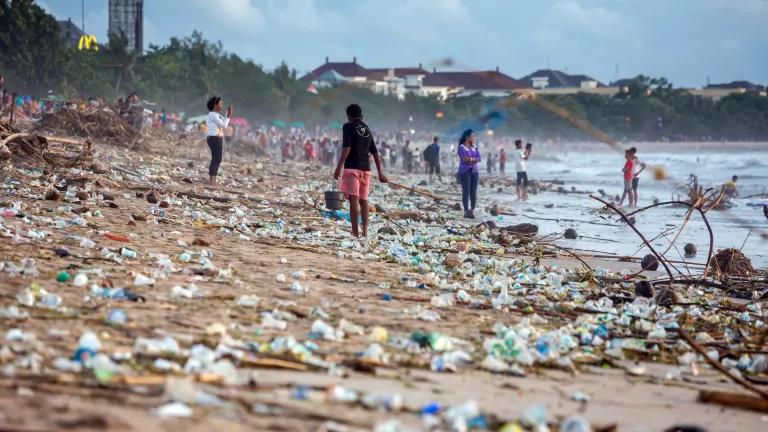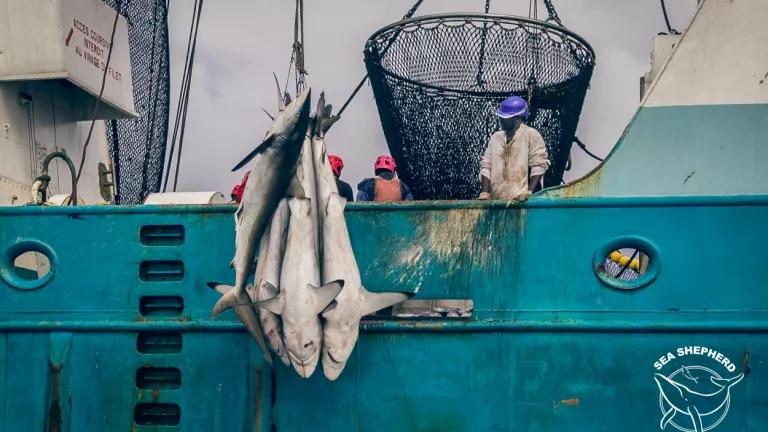Creating a Plastics Free Future
Fossil-fuel derived single-use plastics are all part of the oil and natural gas industry’s war against people and wildlife and a business model that depends on producing an astronomical amount of environmental damage, including plastic pollution.

Beach pollution at Kuta beach, Bali
Plastics are a planetary scourge, jeopardizing wildlife and human health. Fossil-fuel derived single-use plastics are all part of the oil and natural gas industry’s war against people and wildlife and a business model that depends on producing an astronomical amount of environmental damage, including plastic pollution. NRDC is fighting back, joining more than 550 national and local organizations calling for a Presidential Plastics Action Plan that will set the nation on the path to a plastic pollution-free future.
Pollution, including plastic pollution, is one of the direct drivers of nature’s decline, helping produce a world where a million species are threatened with extinction, many within decades. And plastics pose a threat to human health—from the manufacturing process that pollutes our air and water to our exposure to dangerous chemicals as we consume more and more of our food and drinks from single-use plastic wrappers and containers. As demand for oil and natural gas as fuels decline, the petrochemical industry is already ramping up infrastructure to make more plastic. Apparently, it won’t be happy until all our beaches are covered with plastic trash, more wildlife die, and even more micro and nano plastics are found in our bodies’ organs.
We can have a future free of most plastics. We can build a new relationship with nature that promotes diverse and thriving ecosystems filled with abundant wildlife and provides us not with polluted air, water, and food, but the clean air, clean water, and food security we depend on as foundational parts of the planet’s natural life support systems. To get to that future, we have to deal with plastics and the Presidential Plastics Action Plan’s eight components would put us on the right path—eight steps the President can take immediately using existing authority:
- Suspend and deny permits for new or expanded plastic production facilities, associated infrastructure projects, and exports.
- Use the purchasing power of the federal government to eliminate single-use plastic items wherever possible and replace them with reusable products.
- Make corporate polluters pay and reject false solutions.
- Advance environmental justice in petrochemical corridors.
- Update existing federal regulations to curtail pollution from plastics facilities by using best available science and technology.
- Stop subsidizing plastics producers.
- Join international efforts to address the global plastic pollution crisis through new and strengthened multilateral agreements.
- Reduce and mitigate the impacts of discarded and lost fishing gear.
Overall, the solution to the plastics problem is simple: eliminate the production of most plastics, maintaining only what we need for medical or similar necessities. This may seem like a tall order, but keep in mind that half of all plastics ever manufactured were made in the last 15 years (Ugh, manufactured in the last 15 years but will be around for hundreds if not thousands before they decompose!). Plastics are a relatively new phenomenon. If we seamlessly accepted them over the past decades as a ubiquitous part of our every-day lives, we can just as quickly adjust to life without them.
And don’t be tricked into entertaining recycling as a solution. The idea of recycling plastic products is largely a scam propagated by the plastics industry which wants to shift the burden of cleaning up their awful products to the general public. According to the United States Environmental Protection Agency, the U.S. plastic recycling rate is eight percent, with more than 90 percent of plastics in the United States buried, burned, or simply discarded into the environment. While other materials can be effectively recycled, plastics represent a recycling failure. We are not going to recycle our way out of the plastics problem.
Instead, we must take immediate, aggressive action to significantly reduce plastic production and pollution. The Presidential Plastics Action Plan puts us on that path.




